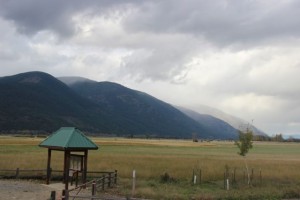
CLOSED read the thick black letters, scrawled in magic marker on a white fabric rectangle. The ugly word hung over the big brown billboard announcing the entrance to the Kootenai National Wildlife Refuge. The government was shut down, and we were shut out.
CLOSED
The declaration was hasty, the sign ad hoc, the letters asymmetrical: the O and the D chunky, the C and S slender and rickety. Whoever wrote the word had done it in a hurry. I imagined a freshly furloughed federal biologist pacing a trailer adorned with screened windows and sagging ceiling tiles, tattered posters of waterfowl strategically thumbtacked to cover up the holes in the particleboard walls.
She surveys the room. Ancient desktop turned off. Coffee pot unplugged. Email set to terse away message — Out of office indefinitely. The original version of her away message had contained a snarky little Deemed inessential, but she’d thought better of it.
She puts her hands in the pockets of her green fleece jacket. She thinks, That’s just about every — oh, crap. She finds the fabric and the marker in a crumbling toolshed full of rebar and flagging tape, the accouterments of unfinished research projects. She scrawls the sign, pins it up, gets in her pickup truck and peels down the rutted access road, headed for the highway. Gone for Ted Cruz knows how long.
***
We get to Bonners Ferry, a little dot in Idaho’s northern chimney, that afternoon, looking for a place to hike. We snatch a brochure for the Kootenai National Wildlife Refuge from the Bonners visitor center and head over. The road parallels the course of the Kootenai River, a big gray trough lined with rip-rap on one bank and poplars on the other. We pull into the muddy parking area. A man and his dog are snoozing in a white hatchback.
CLOSED
“Son of a bitch,” I said. We’d forgotten. But I shouldn’t have. That morning, I’d interviewed a Fish and Wildlife Service biologist in Libby, Montana — one of America’s foremost grizzly bear scientists, a guy who speaks about Ursos arctos with the kind of reverence and wonder and adoration that most people reserve for their newborn children. We talked for an hour, and then I said, Hey, you’ve probably got a million things to do — I can let you go.
He glanced at his watch. “I just got furloughed,” he said, with a lopsided smile. “As of five minutes ago, I’ve got nothing better to do.” We spoke for another two hours.
CLOSED
Juxtaposed against the iconic brown sign/white font combo that signifies the jurisdiction of a federal land management agency, the word looked like vandalism. Which, come to think of it, wouldn’t be a bad description of the actions of certain junior members of the House of Representatives.
We walked to the first trailhead, a five-mile round-trip stroll called Deep Creek. A green laminated sign fluttered on a red cord. On the sign were printed three neat lines, the nearest thing to a haiku I’ve ever seen on federal signage:
Refuge is CLOSED
To ALL Activity
Due to Government Shutdown
Elise, my traveling companion, slipped under the cord. “Should we do it anyway?” she asked.
“I don’t see who’s here to catch us,” I said. We headed down the trail. Hayduke, we weren’t — but still we were minorly thrilled by our miniscule act of civil disobedience. John Boehner was not going to spoil our fun.
Suffice to say, nature had not gotten the governmental memo. Garter snakes rustled through streamside brush. Covens of mule deer browsed on marshy flats and streaked away at our approach. Twisted coils of scat, filled with the fur and teeth of luckless rodents, lined the trail, suggesting the presence of a coyote or badger. A magnificent pileated woodpecker jackhammered at the trunk of a cottonwood.
Meanwhile, other humans were conspicuously absent, daunted by the closure signs or the chilly gray weather. We had the trail to ourselves — save for the animals, of course. For one afternoon, you could say we were shutdown beneficiaries.
As for employees of the Forest Service, the Parks Service, the Fish and Wildlife Service, the EPA, the FDA, the vast constellation of federal agencies that safeguard our public lands and waters and wildlife and resources and health and you name it? They’re among the shutdown’s primary victims. Somewhere along the line, we forgot what essential looks like.
